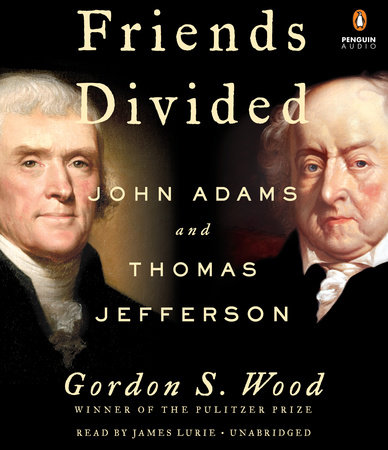 This week at In The Past Lane, the history podcast, we look at the fractious and imperfect, but also quite revealing relationship between two of the most brilliant Founders, John Adams and Thomas Jefferson. The two men came from radically different backgrounds – Adams was the striver from a middle class family in Massachusetts, Jefferson was the entitled one from Virginia. And yet, both became ardent revolutionaries in the 1770s, both served in the Continental Congress, and both were named to the committee that drafted the Declaration of Independence. During the war, both served as diplomats in Europe, and it was there that they developed a warm friendship. Back in the U.S. after the war, both men went on to become Vice President and then President. But it was during these latter years in the fractious 1790s that the friendship between Jefferson and Adams disintegrated into bitter enmity. After Adams lost the Election of 1800 to Jefferson, he returned to Quincy, Massachusetts. Eight years later, Jefferson completed his presidency and returned to Monticello. And it seemed there was little chance they’d ever see each other again, much less become friends. But through the intervention of Dr. Benjamin Rush, the two resumed their friendship in 1812 – through a vibrant correspondence over the next 14 years by way of some 150 letters.
This week at In The Past Lane, the history podcast, we look at the fractious and imperfect, but also quite revealing relationship between two of the most brilliant Founders, John Adams and Thomas Jefferson. The two men came from radically different backgrounds – Adams was the striver from a middle class family in Massachusetts, Jefferson was the entitled one from Virginia. And yet, both became ardent revolutionaries in the 1770s, both served in the Continental Congress, and both were named to the committee that drafted the Declaration of Independence. During the war, both served as diplomats in Europe, and it was there that they developed a warm friendship. Back in the U.S. after the war, both men went on to become Vice President and then President. But it was during these latter years in the fractious 1790s that the friendship between Jefferson and Adams disintegrated into bitter enmity. After Adams lost the Election of 1800 to Jefferson, he returned to Quincy, Massachusetts. Eight years later, Jefferson completed his presidency and returned to Monticello. And it seemed there was little chance they’d ever see each other again, much less become friends. But through the intervention of Dr. Benjamin Rush, the two resumed their friendship in 1812 – through a vibrant correspondence over the next 14 years by way of some 150 letters.
To help us make sense of these two very important – and very different – men, and their very different visions of the form and future of the American republic, I sit down with historian Gordon Wood to talk about his latest book, Friends Divided: John Adams and Thomas Jefferson.
 Among the many things discussed in this episode:
Among the many things discussed in this episode:
How the wealthy and privileged Thomas Jefferson and the middle-class and striving John Adams became allies and friends during the Revolution.
Why the fractious politics of the 1790s shattered the friendship between John Adams and Thomas Jefferson – and what eventually reunited them.
How the friendship between Thomas Jefferson and John Adams was rekindled and led to their famous correspondence.
How Thomas Jefferson established and promoted the idea of American exceptionalism.
Why Thomas Jefferson the idealist dominates the Founding Father landscape (and John Adams, the realist and pessimist, not so much).
How the realism of John Adams and the idealism of Thomas Jefferson embody the primary duality of the American mind.
More about Gordon Wood – website
Recommended reading:
Gordon Wood, Friends Divided: John Adams and Thomas Jefferson (2017).
Gordon Wood, The Creation of the American Republic, 1776-1787 (1969).
Gordon Wood, The Radicalism of the American Revolution (1991)
Gordon Wood, The Americanization of Benjamin Franklin (2004)
Gordon Wood, Empire of Liberty: A History of the Early Republic, 1789-1815 (2009)
Joseph J. Ellis, The Quartet: Orchestrating the Second American Revolution, 1783-1789 (2015).
John Ferling, Adams vs. Jefferson: The Tumultuous Election of 1800 (2004).
David McCullough, John Adams (2001).
Related ITPL Podcast Episodes:
Episode 28 with Carol Berkin on the tumultuous 1790s
https://inthepastlane.com/episode-028/
Episode 25 with Annette Gordon-Reed on Thomas Jefferson
https://inthepastlane.com/episode-025/
Episode 23 with Stephen Knott on Alexander Hamilton
https://inthepastlane.com/episode-023/
Episode 17 with Alan Taylor on American Revolutions
https://inthepastlane.com/017-2/
Episode 9 with William Hogeland on the Whiskey Rebellion
https://inthepastlane.com/episode-009/
Music for This Episode
Jay Graham, ITPL Intro (JayGMusic.com)
Kevin McCleod, “Impact Moderato” (Free Music Archive)
Ketsa, “Follow the Course” (Free Music Archive)
Hyson, “Whispers” (Free Music Archive)
Jon Luc Hefferman, “Winter Trek” (Free Music Archive)
The Bell, “I Am History” (Free Music Archive)
Production Credits
Executive Producer: Lulu Spencer
Technical Advisors: Holly Hunt and Jesse Anderson
Podcasting Consultant: Darrell Darnell of Pro Podcast Solutions
Photographer: John Buckingham
Graphic Designer: Maggie Cellucci
Website by: ERI Design
Legal services: Tippecanoe and Tyler Too
Social Media management: The Pony Express
Risk Assessment: Little Big Horn Associates
Growth strategies: 54 40 or Fight
© In The Past Lane, 2018
